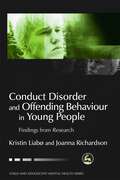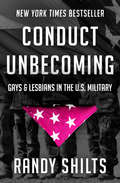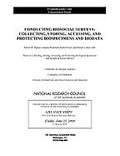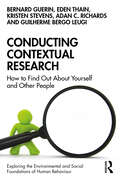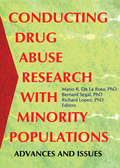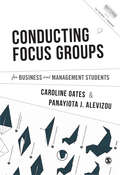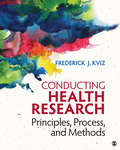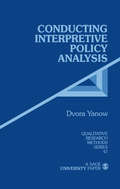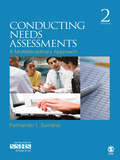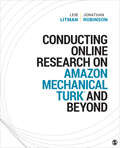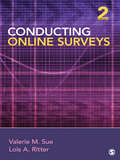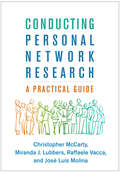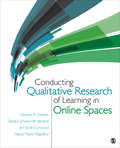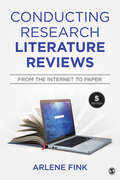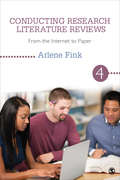- Table View
- List View
Conditionally Accepted: Christians' Perspectives on Sexuality and Gay and Lesbian Civil Rights
by Baker A. RogersThis book explores Mississippi Christians’ beliefs about homosexuality and gay and lesbian civil rights and whether having a gay or lesbian friend or family member influences those beliefs. Beliefs about homosexuality and gay and lesbian rights vary widely based on religious affiliation. Despite having gay or lesbian friends or family members, evangelical Protestants believe homosexuality is sinful and oppose gay and lesbian rights. Mainline Protestants are largely supportive of gay and lesbian rights and become more supportive after getting to know gay and lesbian people. Catholics describe a greater degree of uncertainty and a conditional acceptance of gay and lesbian rights; clear differences between conservative and liberal Catholics are evident. Overall, conservative Christians, both evangelical Protestants and conservative Catholics, hold a religious identity that overshadows their relationships with gay and lesbian friends or family. Conservative religion acts as a deterrent to the positive benefits of relationships with gay and lesbian people.
Conduct Becoming: Good Wives and Husbands in the Later Middle Ages
by Glenn D. BurgerConduct Becoming examines a new genre of late medieval writing that focuses on a wife's virtuous conduct and ability of such conduct to alter marital and social relations in the world. Considering a range of texts written for women—the journées chrétiennes or daily guides for Christian living, secular counsel from husbands and fathers such as Le Livre du Chevalier de La Tour Landry and Le Menagier de Paris, and literary narratives such as the Griselda story—Glenn D. Burger argues that, over the course of the long fourteenth century, the "invention" of the good wife in discourses of sacramental marriage, private devotion, and personal conduct reconfigured how female embodiment was understood.While the period inherits a strongly antifeminist tradition that views the female body as naturally wayward and sensual, late medieval conduct texts for women outline models of feminine virtue that show the good wife as an identity with positive influence in the world. Because these manuals imagine how to be a good wife as necessarily entangled with how to be a good husband, they also move their readers to consider such gendered and sexed identities in relational terms and to embrace a model of self-restraint significantly different from that of clerical celibacy. Conduct literature addressed to the good wife thus reshapes how late medieval audiences thought about the process of becoming a good person more generally. Burger contends that these texts develop and promulgate a view of sex and gender radically different from previous clerical or aristocratic models—one capable of providing the foundations for the modern forms of heterosexuality that begin to emerge more clearly in the fifteenth and sixteenth centuries.
Conduct Books and the History of the Ideal Woman
by Tabitha KenlonAs long as people have been writing books, authors have been using them to create misrepresentations of women. From medieval reality show-style wife tests to 21st century dating guides based on 200-year-old novels, Conduct Books and the History of the Ideal Woman takes listeners on a guided tour of advice on what women should and should not do. <P><P> Think today’s media is bad? In this book, you’ll discover: <P><P> <li>A 16th-century writer who believed women had the power to transform men’s bad thoughts into good ones (if she didn’t and something bad happened, it was her fault - sound familiar?) <li>Why clothes were invented, and that pretty dresses are evil <li>Why young ladies should never read - gasp! - novels <li>The difference between conduct manuals and etiquette books, and why good manners are basically the same as good morals <li>What 20th-century self-help books have in common with the Middle Ages <P><P> Meticulously researched and displaying wry wit (and occasionally exasperation), Conduct Books and the History of the Ideal Woman links 700 years of advice on women’s behavior, tracing a through-line from the earliest printed texts that argued women were the property of men, to various iterations of feminism, to today’s casual misogyny. A must-listen for everyone who is or knows a woman!
Conduct Books for Girls in Enlightenment France
by Nadine BerenguierDuring the eighteenth-century, at a time when secular and religious authors in France were questioning women’s efforts to read, a new literary genre emerged: conduct books written specifically for girls and unmarried young women. In this carefully researched and thoughtfully argued book, Professor Nadine Bérenguier shares an in-depth analysis of this development, relating the objectives and ideals of these books to the contemporaneous Enlightenment concerns about improving education in order to reform society. Works by Anne-Thérèse de Lambert, Madeleine de Puisieux, Jeanne Marie Leprince de Beaumont, Louise d'Epinay, Barthélémy Graillard de Graville, Chevalier de Cerfvol, abbé Joseph Reyre, Pierre-Louis Roederer, and Marie-Antoinette Lenoir take up a wide variety of topics and vary dramatically in tone. But they all share similar objectives: acquainting their young female readers with the moral and social rules of the world and ensuring their success at the next stage of their lives. While the authors regarded their texts as furthering the common good, they were also aware that they were likely to be controversial among those responsible for girls' education. Bérenguier's sensitive readings highlight these tensions, as she offers readers a rare view of how conduct books were conceived, consumed, re-edited, memorialized, and sometimes forgotten. In the broadest sense, her study contributes to our understanding of how print culture in eighteenth-century France gave shape to a specific social subset of new readers: modern girls.
Conduct Disorder and Offending Behaviour in Young People: Findings from Research
by Kristin Liabo Joanna Richardson`This is the latest in a series of accessible, evidence-based resources from Jessica Kingsley Publishers for those seeking to understand and promote young people's mental health. Trawling through the evidence, the authors start by looking at the nature and prevalence of conduct disorders including attention-deficit hyperactivity disorder and how they relate to factors such as depression, substance misuse and learning disabilities. They also look at preventive methods and services available to adolescents in the wake of Ever Child Matters. The book then deals with different approaches to treatment, from individual programmes using cognitive behaviour therapy to family, school-based and pharmacological interventions. It suggests family therapies are the most promising, with little evidence supporting the efficacy of medication.' - Youth Work Now Offending behaviour in young people is a problem not only for affected neighbours and communities; it is also a serious problem for the young people involved. Behaviour problems and involvement in criminal activities have been linked to continued offending, substance misuse, lack of education and work - all factors that are linked, in turn, with shorter life expectancy. This book reviews the literature on a number of techniques and treatment approaches designed for use with adolescent conduct disorder and young offenders. The authors also provide an overview of the condition including its developmental pathway; the criteria for diagnosing conduct disorder, and services for adolescents. Conduct disorder and offending behaviour in young people are complex problems that need multi-agency, multifaceted solutions. This book aims to contribute to the design of services by drawing on a wide range of high-quality research, and presents it for the non-specialist. It is essential reading for child and adolescent mental health practitioners, social workers, youth offending teams and other professionals working with young people with conduct problems and their families.
Conduct Unbecoming: Gays & Lesbians in the U.S. Military
by Randy Shilts&“A thoroughly researched and engrossingly readable history&” of gay men and women in the American armed forces by the author of And the Band Played On (The New York Times Book Review). Published during the same year the American military instituted Don&’t Ask, Don&’t Tell, and eighteen years before President Barack Obama repealed it, Conduct Unbecoming is a landmark work of social justice and a searing indictment of the military establishment&’s historic bigotry toward its gay servicemen and women. Randy Shilts&’s eye-opening book describes the bravery, both exceptional and everyday, not only of gay soldiers throughout history, but also of gay men and women serving in our modern military. With each anecdote and investigation, Shilts systematically dismantles the arguments against allowing gays to serve in the military. At once a history of the American military and an account of the gay rights movement, Conduct Unbecoming is a remarkable testament to the progress achieved for gays in the military—and a revealing look at how far we have yet to go.
Conducting Biosocial Surveys: Collecting, Storing, Accessing, and Protecting Biospecimens and Biodata
by National Research Council of the National AcademiesRecent years have seen a growing tendency for social scientists to collect biological specimens such as blood, urine, and saliva as part of large-scale household surveys. By combining biological and social data, scientists are opening up new fields of inquiry and are able for the first time to address many new questions and connections. But including biospecimens in social surveys also adds a great deal of complexity and cost to the investigator's task. Along with the usual concerns about informed consent, privacy issues, and the best ways to collect, store, and share data, researchers now face a variety of issues that are much less familiar or that appear in a new light. In particular, collecting and storing human biological materials for use in social science research raises additional legal, ethical, and social issues, as well as practical issues related to the storage, retrieval, and sharing of data. For example, acquiring biological data and linking them to social science databases requires a more complex informed consent process, the development of a biorepository, the establishment of data sharing policies, and the creation of a process for deciding how the data are going to be shared and used for secondary analysis--all of which add cost to a survey and require additional time and attention from the investigators. These issues also are likely to be unfamiliar to social scientists who have not worked with biological specimens in the past. Adding to the attraction of collecting biospecimens but also to the complexity of sharing and protecting the data is the fact that this is an era of incredibly rapid gains in our understanding of complex biological and physiological phenomena. Thus the tradeoffs between the risks and opportunities of expanding access to research data are constantly changing. Conducting Biosocial Surveys offers findings and recommendations concerning the best approaches to the collection, storage, use, and sharing of biospecimens gathered in social science surveys and the digital representations of biological data derived therefrom. It is aimed at researchers interested in carrying out such surveys, their institutions, and their funding agencies.
Conducting Contextual Research: How to Find Out About Yourself and Other People (Exploring the Environmental and Social Foundations of Human Behaviour)
by Bernard Guerin Eden Thain Kristen Stevens Adan C. Richards Guilherme Bergo LeugiThis innovative book proposes an entirely new approach to social research, presenting practical ways to discover people’s life contexts in order to understand why they do what they do, which is essential for any forms of research that need to understand people.Taking a novel approach that goes beyond traditional categorisations of qualitative and quantitative research, the book starts by discussing the real basis of all research methods in social relationships, before detailing the methods for finding out about a person’s life contexts in very practical terms, accompanied by suggested questions, advice, and research tricks to help you progress. The various life contexts are then worked through chapter by chapter. Drawing on the rich and varied research experiences of all the authors, examples are given throughout, with later chapters focusing on specific research areas.Conducting Contextual Research is essential reading for postgraduate students and professionals in the fields of counselling, psychology and social work, and will be useful to anyone conducting research or inquiries to understand human behaviour, including academic researchers, detectives, intelligence operators, social workers, government service researchers, social policy analysts, and biographers.
Conducting Drug Abuse Research with Minority Populations: Advances and Issues
by Bernard SegalBe a better researcher when studying drug abuse among minorities! Conducting Drug Abuse Research with Minority Populations: Advances and Issues brings you the voices of drug abuse researchers who discuss the most important concerns about conducting research in drug-taking minority populations. In this strategy-based book, you&’ll find yourself beneficially involved in a discussion of many of the central methodological advances facing researchers today, specifically in the target area of minority communities and their drug-using societies. Conducting Drug Abuse Research with Minority Populations presents crucial recommendations and strategies that will lead you toward unprecedented effectiveness and efficiency when researching this subsection of the world&’s drug users. In addition, find new ways to involve community members in the research process, and you&’ll come to more fully understand the impact of cultural values, attitudes, and norms in the drug-taking patterns of minority persons. With this book, you will learn more about: the importance of advisory boards, gatekeepers, and indigenous workers in this type of research the crucial role of incentives in recruiting and retaining minority persons in drug abuse studies focus groups as tools to minimize selection bias of minority subjects how cultural values may affect research strategies how research teams can facilitate the collection of data within minority communities Researchers, college educators, and substance abuse practitioners will find that Conducting Drug Abuse Research with Minority Populations improves their efforts to produce more viable data in a much shorter time span.
Conducting Focus Groups for Business and Management Students (Mastering Business Research Methods)
by Panayiota J. Alevizou Caroline J. OatesIn Conducting Focus Groups, Caroline J. Oates and Panayiota J. Alevizou explain what is involved in conducting focus groups, outlining their main features, use in research, their design and the kind of rich, qualitative data they facilitate. Ideal for Business and Management students reading for a Master’s degree, each book in the series may also serve as reference books for doctoral students and faculty members interested in the method. Part of SAGE’s Mastering Business Research Methods, conceived and edited by Bill Lee, Mark N. K. Saunders and Vadake K. Narayanan and designed to support researchers by providing in-depth and practical guidance on using a chosen method of data collection or analysis. Watch the editors introduce the Mastering Business Research Methods series
Conducting Focus Groups for Business and Management Students (Mastering Business Research Methods)
by Panayiota J. Alevizou Caroline J. OatesIn Conducting Focus Groups, Caroline J. Oates and Panayiota J. Alevizou explain what is involved in conducting focus groups, outlining their main features, use in research, their design and the kind of rich, qualitative data they facilitate. Ideal for Business and Management students reading for a Master’s degree, each book in the series may also serve as reference books for doctoral students and faculty members interested in the method. Part of SAGE’s Mastering Business Research Methods, conceived and edited by Bill Lee, Mark N. K. Saunders and Vadake K. Narayanan and designed to support researchers by providing in-depth and practical guidance on using a chosen method of data collection or analysis.
Conducting Health Research: Principles, Process, and Methods
by Frederick J. KvizConducting Health Research: Principles, Process, and Methods presents an integrated and practical introduction to the principles and strategies for planning, implementing, reporting, and assessing health sciences research. Comprehensive in its breadth and depth, with an accessible writing style, this text prepares students in public health and related fields to be adept researchers and consumers of health research. Through real-world examples and step-by-step guidance, Frederick J. Kviz provides students with the skills they need to: identify and evaluate research strengths and limitations as practitioners; to actually perform the various core aspects of research; and to choose among alternative methods when making decisions about health practice, policy, and future research needs.
Conducting Health Research: Principles, Process, and Methods
by Frederick J. KvizConducting Health Research: Principles, Process, and Methods presents an integrated and practical introduction to the principles and strategies for planning, implementing, reporting, and assessing health sciences research. Comprehensive in its breadth and depth, with an accessible writing style, this text prepares students in public health and related fields to be adept researchers and consumers of health research. Through real-world examples and step-by-step guidance, Frederick J. Kviz provides students with the skills they need to: identify and evaluate research strengths and limitations as practitioners; to actually perform the various core aspects of research; and to choose among alternative methods when making decisions about health practice, policy, and future research needs.
Conducting Interpretive Policy Analysis
by Dvora YanowIn this new and timely book in the Qualitative Research Methods series, author Dvora Yanow outlines a more interpretive approach to policy analysis. She begins by describing what interpretive approaches are, and what they can mean to policy analysis. Chapters on symbolic language, symbolic objects, and symbolic acts help shift the frame of reference from thinking about values as costs and benefits to thinking about them more as a set of meanings. Finally, the book concludes with a chapter on how to move from fieldwork to deskwork and textwork.
Conducting Interviews with Child Victims of Abuse and Witnesses of Crime: A Practical Guide
by Mireille CyrThis book is a practical and thoughtful guide for the forensic interview of children, presenting a synthesis of the empirical and theoretical knowledge necessary to understand the account of child victims of abuse or witnesses of crime. It is a complex task to interview children who are suspected of being abused in order to gather their stories, requiring the mastery of many skills and knowledge. This book is a practical one in that constant links are made between the results of the research and their relevance for the interventions made when interviewing child victims of abuse or witnesses of crime and in understanding their accounts. This book also presents in a detailed and concrete way the revised version of the National Institute of Child Health and Human Development (NICHD-R) Protocol, a forensic structured interview guide empirically supported by numerous studies carried out in different countries. The step-by-step explanations are illustrated with a verbatim interview with a child, as well as other tools to help the interviewer to prepare and handle an efficient and supportive interview. Conducting Interviews with Child Victims of Abuse and Witnesses of Crime is essential reading for stakeholders in the justice, social and health systems as well as anyone likely to receive allegations from children such as educators or daycare staff. Although the NICHD-R Protocol is intended for forensic interviewers, the science behind its development and application is relevant to all professionals working with children.
Conducting Needs Assessments: A Multidisciplinary Approach
by Fernando I. SorianoThis thoroughly revised edition of the best-selling book Conducting Needs Assessment offers a brief, how-to guide that demystifies the process of planning a community intervention by helping both students and practitioners understand how to plan and conduct a needs assessment. Coverage includes planning the needs assessment, including the variety of methods used, survey methods and sample sizes, data collection and analysis, and reporting the findings. To aid students' understanding, Soriano engages the students in the process of planning a community intervention by using clear, real-world examples and basic terms that have been updated to reflect current issues and HIPPA regulations.
Conducting Online Research on Amazon Mechanical Turk and Beyond (SAGE Innovations in Research Methods #1)
by Jonathan Robinson Leib LitmanConducting Online Research on Amazon Mechanical Turk® and Beyond, written by Leib Litman and Jonathan Robinson, provides both students and experienced researchers with essential information about the online platforms most often used for social science research. This insightful and accessible text answers common questions like, "How do I maintain data quality in online studies?," "What is the best way to recruit hard-to-reach samples?" and "How can researchers navigate the ethical issues that are unique to online research?" Drawing on their experiences as the founders of CloudResearch (formerly TurkPrime), the authors provide information that guides new users planning their first online studies and engages even the most experienced researchers with detailed discussions about the challenges of online research. The book begins with an overview of Amazon’s Mechanical Turk and its rapid rise within academic research. Then, the authors describe how to set up an MTurk study with screenshots that walk readers through the steps of creating an account, designing a study, collecting data, and using third-party applications to enhance MTurk’s functionality. Later chapters provide readers with a detailed understanding of the MTurk environment and use data from hundreds of thousands of participants and tens of millions of completed tasks to dive into issues like participant demographics, sources of sampling bias, and the generalizability of findings from MTurk. Finally, the book explores the benefits of using other online platforms as a complement to MTurk and the ethical issues that are unique to conducting research with online participant platforms. Throughout the book, the authors share hands-on advice and best practices, such as those for conducting longitudinal studies or carrying out complex studies. Altogether the mix of data, insight, and advice make this book an essential resource for researchers who want to understand the online environment and the most effective ways to conduct research online.
Conducting Online Research on Amazon Mechanical Turk and Beyond (SAGE Innovations in Research Methods #1)
by Jonathan Robinson Leib LitmanConducting Online Research on Amazon Mechanical Turk® and Beyond, written by Leib Litman and Jonathan Robinson, provides both students and experienced researchers with essential information about the online platforms most often used for social science research. This insightful and accessible text answers common questions like, "How do I maintain data quality in online studies?," "What is the best way to recruit hard-to-reach samples?" and "How can researchers navigate the ethical issues that are unique to online research?" Drawing on their experiences as the founders of CloudResearch (formerly TurkPrime), the authors provide information that guides new users planning their first online studies and engages even the most experienced researchers with detailed discussions about the challenges of online research. The book begins with an overview of Amazon’s Mechanical Turk and its rapid rise within academic research. Then, the authors describe how to set up an MTurk study with screenshots that walk readers through the steps of creating an account, designing a study, collecting data, and using third-party applications to enhance MTurk’s functionality. Later chapters provide readers with a detailed understanding of the MTurk environment and use data from hundreds of thousands of participants and tens of millions of completed tasks to dive into issues like participant demographics, sources of sampling bias, and the generalizability of findings from MTurk. Finally, the book explores the benefits of using other online platforms as a complement to MTurk and the ethical issues that are unique to conducting research with online participant platforms. Throughout the book, the authors share hands-on advice and best practices, such as those for conducting longitudinal studies or carrying out complex studies. Altogether the mix of data, insight, and advice make this book an essential resource for researchers who want to understand the online environment and the most effective ways to conduct research online.
Conducting Online Surveys
by Lois A. Ritter Valerie M. SueConducting Online Surveys is a complete guide to conducting survey research using digital modalities. Many topics discussed, such as developing online and mobile questionnaires, are unique to digital surveys, whereas others, such as creating reliable survey questions, are common to all survey environments. The expansion of low-cost software options has opened up this area to a broad range of researchers, and the need for a comprehensive text for developing, implementing, and reporting digital surveys is greater than ever. This Second Edition reflects the significant developments in technology and the methodological literature since the publication of the First Edition. It captures in one single volume everything you need to know about conducting digital surveys from start to finish.
Conducting Personal Network Research: A Practical Guide (Methodology in the Social Sciences)
by Christopher McCarty Miranda J. Lubbers Raffaele Vacca José Luis MolinaWritten at an introductory level, and featuring engaging case examples, this book reviews the theory and practice of personal and egocentric network research. This approach offers powerful tools for capturing the impact of overlapping, changing social relationships and contexts on individuals' attitudes and behavior. The authors provide solid guidance on the formulation of research questions; research design; data collection, including decisions about survey modes and sampling frames; the measurement of network composition and structure, including the use of name generators; and statistical modeling, from basic regression techniques to more advanced multilevel and dynamic models. Ethical issues in personal network research are addressed. User-friendly features include boxes on major published studies, end-of-chapter suggestions for further reading, and an appendix describing the main software programs used in the field.
Conducting Qualitative Research of Learning in Online Spaces
by Hannah R. Gerber Sandra Schamroth Abrams Jen Scott Curwood Alecia Marie MagnificoQualitative researchers have grappled with how online inquiry shifts research procedures such as gaining access to spaces, communicating with participants, and obtaining informed consent. Drawing on a multimethod approach, Conducting Qualitative Research of Learning in Online Spaces explores how to design and conduct diverse studies in online environments. The book focuses on formal and informal learning practices that occur in evolving online spaces. The text shows researchers how they can draw upon a variety of theoretical frameworks, methodological approaches, and data sources. Examples of qualitative research in online spaces, along with guiding questions, support readers at every phase of the research process.
Conducting Qualitative Research of Learning in Online Spaces
by Hannah R. Gerber Sandra Schamroth Abrams Jen Scott Curwood Alecia Marie MagnificoQualitative researchers have grappled with how online inquiry shifts research procedures such as gaining access to spaces, communicating with participants, and obtaining informed consent. Drawing on a multimethod approach, Conducting Qualitative Research of Learning in Online Spaces explores how to design and conduct diverse studies in online environments. The book focuses on formal and informal learning practices that occur in evolving online spaces. The text shows researchers how they can draw upon a variety of theoretical frameworks, methodological approaches, and data sources. Examples of qualitative research in online spaces, along with guiding questions, support readers at every phase of the research process.
Conducting Research Literature Reviews: From the Internet to Paper
by Arlene G. FinkProviding readers with an accessible, in-depth look at how to synthesize research literature, Conducting Research Literature Reviews: From the Internet to Paper is perfect for students, researchers, marketers, planners, and policymakers who design and manage public and private agencies, conduct research studies, and prepare strategic plans and grant proposals. Bestselling author Arlene Fink shows readers how to explain the need for and significance of research, as well as how to explain a study’s findings. Offering a step-by-step approach to conducting literature reviews, the Fifth Edition features new research, examples, and references from the social, behavioral, and health sciences, expanded coverage of qualitative research, updated and revised meta-analysis procedures, a brand new glossary of key terms, double the number of exercises, and additional examples of how to write reviews.
Conducting Research Literature Reviews: From the Internet to Paper
by Arlene G. FinkProviding readers with an accessible, in-depth look at how to synthesize research literature, Conducting Research Literature Reviews: From the Internet to Paper is perfect for students, researchers, marketers, planners, and policymakers who design and manage public and private agencies, conduct research studies, and prepare strategic plans and grant proposals. Bestselling author Arlene Fink shows readers how to explain the need for and significance of research, as well as how to explain a study’s findings. Offering a step-by-step approach to conducting literature reviews, the Fifth Edition features new research, examples, and references from the social, behavioral, and health sciences, expanded coverage of qualitative research, updated and revised meta-analysis procedures, a brand new glossary of key terms, double the number of exercises, and additional examples of how to write reviews.
Conducting Research Literature Reviews: From the Internet to Paper
by Dr Arlene G. FinkProviding readers with an accessible, in-depth look at how to synthesize research literature, Conducting Research Literature Reviews is perfect for students, researchers, marketers, planners, and policymakers who design and manage public and private agencies, conduct research studies, and prepare strategic plans and grant proposals. Bestselling author Arlene Fink shows readers how to explain the need for and significance of research, as well as how to explain a study’s findings. Offering a step-by-step approach to conducting literature reviews, the Fourth Edition features updated examples and covers: how to select databases and evaluate their quality; selecting and organizing key words and other terms in order to effectively search databases and the Web; setting standards for evaluating the quality of research and other literature; extracting and recording information from articles and studies; synthesizing what the reader finds either descriptively or via a meta-analysis; recording and storing the results in a virtual file cabinet; and how to use bibliographic software.

